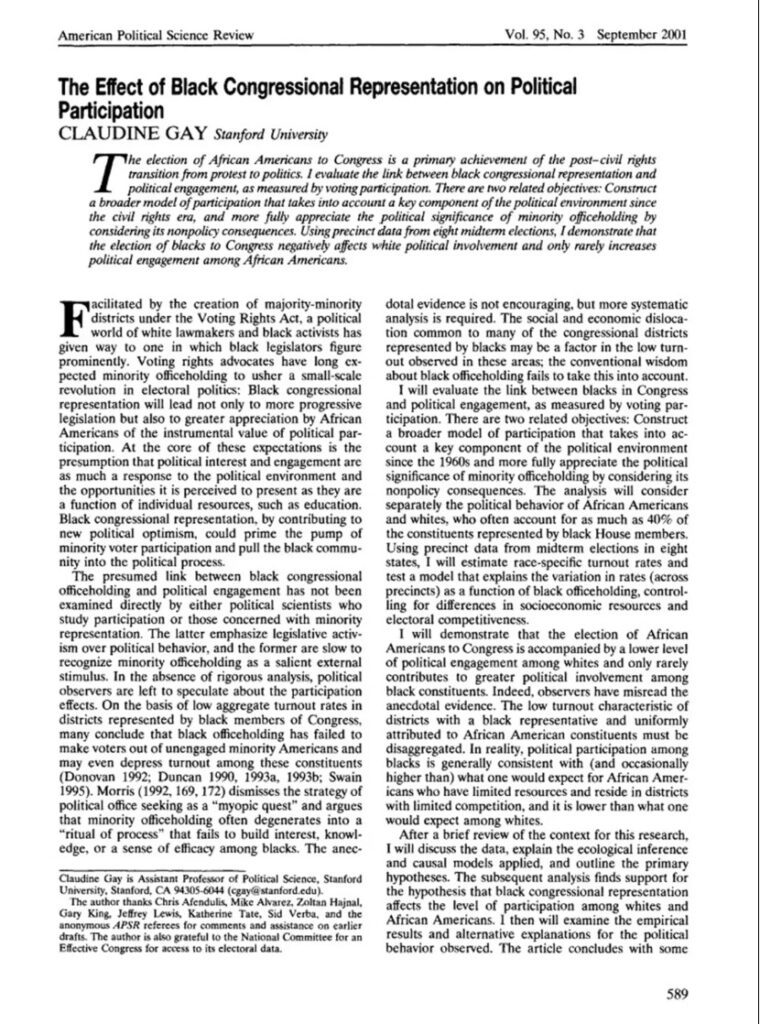Diversity, Equity and Inclusion programs, we are assured, were designed with the “best of intentions.” If American academia lacks representation for minorities, what better way to correct the disparity than with DEI?
However, academia must be driven by results — not identity — if it is to fulfill its mission of seeking the truth and building a repository of knowledge.
This is the logical inconsistency at the heart of academia mirrored by that of a highly scrutinized research paper published by Harvard President Claudine Gay.
Claudine Gay recently came under fire for her awkward and suspect response to Congressional questioning over the recent pro-Hamas demonstrations on college campuses like Harvard University.
“At Harvard, does calling for the genocide of Jews violate Harvard’s rules of bullying and harassment?” Stefanik asked.
“It can be, depending on the context,” Gay responded.
Her remarks were clearly incompatible with the doctrine of creating “safe spaces” for college students to explore ideas without being personally threatened. Gay’s weak defense of equal rights for Jewish students exposed the intellectual rot of the nation’s universities.
Gay subsequently issued a half-hearted apology in the Harvard Crimson.
“I am sorry,” Gay said in an interview with The Crimson. “Words matter.”
“When words amplify distress and pain, I don’t know how you could feel anything but regret,” Gay added.
But Gay’s infelicitous remarks only bely a deeper issue with her appointment to lead the nation’s most prestigious institute of higher learning: Her academic credentials are extremely dubious to begin with.
Indeed, Gay indeed has plenty of ‘privilege’ when it comes to her academic record; particularly, she has faced serious accusations of plagiarism that would certainly land a scholar of an ‘unprotected class’ in deep trouble, if not exiled from top universities.
Dr. Carol M. Swain, a political scientist who happens to also be a black woman, accused Gay of lifting passages from her research. Additionally, the Harvard president is credibly accused of copying passages from the work of several other academics for her doctoral dissertation and three scholarly articles.
However, Harvard University, after a purported investigation into the matter, closed the case by labeling Gay’s infractions as “inadequate citations” but with “no evidence of intentional deception… or research misconduct.”
Beyond the plagiarism accusations, however, there is a deeper questioning of the merit of her academic research. A 2001 paper published in the American Political Science Review entitled ‘The Effect of Black Congressional Representation on Political Participation’ is listed as one of four peer-reviewed political science articles that secured her tenure at Stanford University.


The research paper attempts to test the hypothesis that “the election of blacks to Congress negatively affects white political involvement and only rarely increases political engagement among African Americans.”
Jonathan Pallesen, who is not a political scientist but possesses a PhD. in statistical genetics, examined the data provided by Claudine Gay.
Claudine Gay wrote two times about the hypothesis that Black representation causes lower voting turnout among Whites.
There are odd differences between the two works.
Originally she looked at it in her PhD thesis, and then she redid the analysis in a 2001 APSR paper. In the… pic.twitter.com/0oHgwjjZsD
— Jonatan Pallesen (@jonatanpallesen) December 26, 2023
Pallesen uncovers an unexplained disclusion of statistics for Illinois, which appear to contradict her hypothesis.
“At the bottom of the table, there are three data points which go against the hypothesis, and instead have larger White turnout in the districts with Black representatives,” he points out in reference to her PhD. thesis.
“But then in her APSR paper: Illinois disappeared! Why were the results from Illinois not included, when they were included in the PhD thesis?” he asks.
“If we look again at the table for the results from the thesis, two out of the three results that go against the hypothesis are in Illinois,” he continues. “The ASPR paper doesn’t mention any specific reason for why Illinois was excluded.”
Claudine Gay refused to turn over her data when questioned about the inconsistency.
Pallesen provided more analysis of Gay’s published results.
If we look at Claudine Gay's 2001 paper, there are some numbers that raises questions. This has been discussed on Econjobrumors.
The thesis is that Black representatives make White people vote less.
Looking at the the White Turnout in Clay's district it seems to be about middle… pic.twitter.com/4I49lbZo53
— Jonatan Pallesen (@jonatanpallesen) December 23, 2023
Two professors shredded Gay’s PhD. thesis for “logical inconsistencies,” as reported by the New York Post.
In 2002, Michael C. Herron, the Remsen 1943 professor of quantitative social science at Dartmouth, and Kenneth W. Shotts, the David S. and Ann M. Barlow professor of political economy at Stanford Graduate School of Business, claimed to debunk the very foundation of Gay’s research.
At a conference of the Society for Political Methodology (PolMeth) that year, Herron and Shotts presented their research, finding inconsistencies in Gay’s paper where she concluded that the election of black Americans to Congress negatively affects white political involvement and rarely increases political engagement among black people.
According to the two professors, Gay’s analysis and extrapolations were based on the statistical practice known as ecological regression (El-R), which Herron and Shotts have spent years demonstrating leads to “logical inconsistencies.”
While Herron and Shotts highlighted errors by other researchers using El-R, they noted that their probe into how Gay reached her conclusion and the stats she listed were limited because she refused to share her research with them.
“We were, however, unable to scrutinize Gay’s results because she would not release her dataset to us,” the researchers noted in their 2002 paper.
Christopher Brunet, a contributing editor at The American Conservative who also writes an online newsletter at karlstack.substack.com, recently dissected the research paper at The Dossier.
Brunet notes that Gay’s research was shredded in the 2002 conference paper, but that getting one’s hands on the paper had proven to be elusive. He was, however, able to procure it.
This takedown of Gay’s work was removed from the final version of Herron and Shotts’ paper (it was replaced with a ”hypothetical example” of flawed work), and any mention of the conference paper was scrubbed from PolMeth website, where this paper was presented.
This working paper with the damning footnote is not available anywhere on the internet, but I exclusively managed to get my hands on it.
Brunet further notes that Gay’s research flies in the face of the preaching of her adviser and mentor Gary King, who strongly insisted that researchers provide all of their data in replicable form in order for others to test their hypotheses.
He cites Stephen McIntyre, who points out, ‘‘Ironically, Gary King, [Claudine Gay’s advisor and mentor], was a zealous advocate of authors providing data in replicable form. The “replication standard” advocated by Gary King began with the replication data set, which needed to be publicly available and cited in the original publication. King urged that adherence to replication standard be considered by tenure and promotion committees.”
Thus, DEI hires like Claudine Gay have exposed the intellectual rot that has proceeded under academia’s full-tilt pushing of neomarxist doctrine. It has wrought a cultish ideology that is incompatible with excellence in academic standards, in addition to being deleterious for personal accountability and intellectual integrity.
Claudine Gay is merely the poster woman for the spectacular failure of DEI. Harvard’s refusal to take accountability for hiring a woman who is plausibly accused of being an intellectual fraud is part-and-parcel of the entire broken American academic system.
NOW READ:
Air Force Academy Blasts End of Race-Based Admissions, Bemoans Loss of DEI Standards







